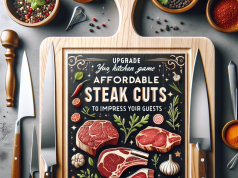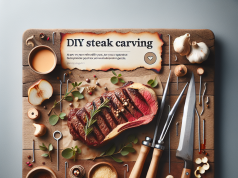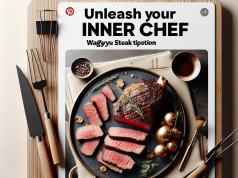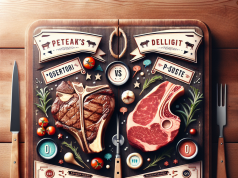Contents
Exploring the Premium: The Economics and Rarity of Wagyu Steak
In this article, we will delve into the economics and rarity of Wagyu steak, a highly prized and sought-after type of beef with exceptional marbling and tenderness. Understanding the factors that contribute to its premium price and limited availability can enhance our appreciation for this culinary delicacy.
Wagyu, which translates to “Japanese cow,” originated in Japan and is renowned worldwide for its superior quality. The unique flavor and texture of Wagyu steak are the result of a combination of factors, including the cow’s genetics, the specific diet it is fed, and the meticulous rearing techniques employed by Japanese farmers.
These factors contribute to the development of intramuscular fat, known as marbling, which gives Wagyu its characteristic melt-in-your-mouth tenderness. The delicate balance of mono and polyunsaturated fats contributes to its rich, buttery flavor.
The rarity of Wagyu steak is due to several reasons. Firstly, Wagyu cattle have a limited population globally, with Japan maintaining strict regulations on their breeding and export. Secondly, the unique rearing techniques and diet required to produce the distinctive qualities of Wagyu beef demand significant time, effort, and resources, making it a labor-intensive and costly process.
Furthermore, Wagyu steaks are typically graded using the Japanese Beef Marbling Standard (BMS), which assesses the amount and distribution of marbling within the meat. Only the highest grades, such as A5, which denotes the highest level of marbling, are considered true Wagyu steak. This stringent grading system further limits the availability of genuine Wagyu beef.
As a result of these factors, the economics of Wagyu steak dictate that it fetches a premium price in the market. The scarcity, meticulous production process, and exceptional taste contribute to its reputation as a luxury item. It is highly regarded by chefs and food enthusiasts alike, often making it a centerpiece dish in fine dining establishments.
In conclusion, exploring the economics and rarity of Wagyu steak enhances our understanding and appreciation for this exclusive culinary experience. The combination of limited availability, meticulous production techniques, and exquisite flavor make Wagyu steak a symbol of luxury in the fine dining world.
🔥Premium Angus Beef T-Bone – SHOP NOW🔥
Exploring the Premium: The Economics and Rarity of Wagyu Steak
For a more in-depth look into the history and origin of Wagyu beef, check out our previous blog post.
The Art of Raising Wagyu Cattle
Wagyu cattle, primarily raised in Japan, are famous for their exceptional meat quality. These cattle are meticulously bred and raised with utmost care and attention. The strict breeding regulations and unique feeding techniques contribute to the formation of intricate marbling, which enhances tenderness and flavor.
The Economics of Wagyu Beef
Wagyu beef enjoys a prominent status in the culinary world, and its demand continues to grow steadily worldwide. Given the extensive resources and time required to rear these cattle, Wagyu beef naturally carries a premium price tag. The scarcity of this delicacy, coupled with its unparalleled taste and texture, makes it highly sought after by chefs and meat enthusiasts around the globe.
The Rarity and Grading System
Wagyu beef is graded based on strict criteria designed to assess its marbling, meat texture, and color. The Japanese grading system, ranging from A1 to A5, helps differentiate different levels of quality within the Wagyu beef market. A5 Wagyu, the highest grading, exhibits the greatest degree of marbling and tenderness, making it exceptionally valuable and rare.
Mastering the Perfect Wagyu Steak
Preparing a Wagyu steak requires some finesse to bring out its exceptional qualities. Dry-aged or fresh, seared or slow-cooked, each cooking method has its own merits. However, the consensus remains clear – a medium-rare Wagyu steak, seasoned minimally to allow its natural flavors to shine, is the ultimate way to appreciate its distinct characteristics.
Conclusion
Exploring the world of premium Wagyu steak reveals the intricate economics and rarity behind this highly cherished delicacy. From the art of raising Wagyu cattle to the rigorous grading system and the perfect cooking techniques, every aspect contributes to the extraordinary experience that awaits steak lovers.
Keywords: Wagyu steak, economics, rarity, beef, marbling, grading system, cooking techniques, delicacy.
Frequently Asked Questions
Exploring the Premium: The Economics and Rarity of Wagyu Steak
What is Wagyu steak?
Wagyu steak refers to a specific type of beef originating from Japanese cattle. The term “Wagyu” translates to “Japanese cow.” It is renowned for its unrivaled tenderness, marbling, and rich flavor. The meat is highly sought after around the world due to its exceptional quality.
What makes Wagyu steak so expensive?
The high price of Wagyu steak can be attributed to several factors. Firstly, the rearing process is rigorous and time-intensive. Wagyu cattle are raised in specific regions of Japan and are subject to strict guidelines regarding their diet, living conditions, and genetic heritage.
Additionally, the unique marbling and tenderness of the meat result from a genetic predisposition in the Wagyu breed. This genetic trait is a result of careful selective breeding over many generations. The scarcity of Wagyu beef, as well as the limited supply due to its small-scale production, further contribute to its high price.
How is Wagyu steak graded?
Wagyu steak is graded based on its marbling, color, texture, and firmness. The highest quality Wagyu beef is given the highest possible grades, typically ranging from A5 (the highest) to A3 or B3. These grades represent the superior taste, tenderness, and overall quality of the beef.
Is there a difference between Wagyu and Kobe beef?
Yes, there is a distinction between Wagyu and Kobe beef. While Kobe beef is a specific type of Wagyu beef, it refers exclusively to the meat produced from Wagyu cattle raised in the Kobe region of Japan. Similar to Wagyu beef, Kobe beef is known for its exceptional flavor and marbling.
How should I cook Wagyu steak?
Wagyu steaks are best cooked using simple techniques that allow the natural flavors of the meat to shine through. Most chefs recommend cooking Wagyu steaks on a hot grill or skillet to sear the meat quickly and evenly. Due to its high fat content, Wagyu steak should be cooked to no more than medium-rare to avoid excessive rendering of fat and potential loss of flavor.
Why is Wagyu Steak Price So High?
Understanding the Exquisite Quality
When it comes to indulging in some of the finest steaks in the world, nothing quite compares to the exquisite taste and texture of Wagyu beef. Renowned for its high marbling and melt-in-your-mouth tenderness, Wagyu steak has gained immense popularity among food enthusiasts and connoisseurs around the globe.
Factors Influencing Wagyu Steak Price
However, such extraordinary quality comes at a cost. The price of Wagyu steak is often significantly higher compared to other types of beef. There are several key factors that contribute to the premium price tag:
- 1. Genetic Purity: Authentic Wagyu cattle have specific genetic traits and bloodlines, which are preserved and carefully bred to maintain the breed’s superior characteristics. The strict regulation and limited availability of purebred Wagyu contribute to the higher price.
- 2. Specialized Feeding: Wagyu cattle are raised with meticulous attention to their diet. They are typically fed a carefully balanced mix of high-quality grains, which helps in developing the distinctive marbling that sets Wagyu beef apart from others. This specialized feeding regime adds to the overall cost.
- 3. Extended Rearing Period: Unlike conventional beef, Wagyu cattle require an extended rearing period. This results in increased investments in resources such as feed, veterinary care, and land usage, ultimately leading to higher costs.
- 4. Labor and Expertise: Raising and producing Wagyu beef requires a high level of expertise and labor-intensive processes. From the cattle’s diet management to ensuring their well-being, each step demands extra attention and effort, further driving up the overall expenses.
Worth Every Penny
Despite the relatively high Wagyu steak price, many food enthusiasts consider it a worthwhile investment. The exceptional taste, tenderness, and unforgettable dining experience offered by these delectable steaks make them highly sought after.
To learn more about the history, production methods, and different cuts of Wagyu beef, visit the Wagyu beef Wikipedia page.
Premium Angus Beef T-Bone – SHOP NOW
The Economics of Wagyu Steak
- Wagyu steak is a highly sought after and expensive type of beef.
- The premium price of Wagyu is due to its unique characteristics, such as its marbling and tenderness.
- Wagyu cattle require special care and a specific diet to develop the desired quality of meat.
- There is a limited supply of Wagyu beef globally, contributing to its rarity and high price.
- Wagyu steak has a strong demand, particularly in high-end restaurants and among meat enthusiasts.
The Rarity of Wagyu Steak
- Wagyu cattle are primarily bred and raised in Japan, with strict regulations to maintain the authenticity of the breed.
- The production process for Wagyu beef is meticulous and time-consuming, resulting in lower quantities compared to regular beef.
- Wagyu cattle have a slow growth rate, requiring longer raising periods and increasing the rarity of the meat.
- The genetic superiority of Wagyu cattle is carefully maintained through selective breeding, contributing to the exclusivity of the meat.
- The grading system for Wagyu beef ensures that only the highest quality cuts make it to the market, further enhancing its scarcity.
Category – STEAKS, BURGER & MEATS







































